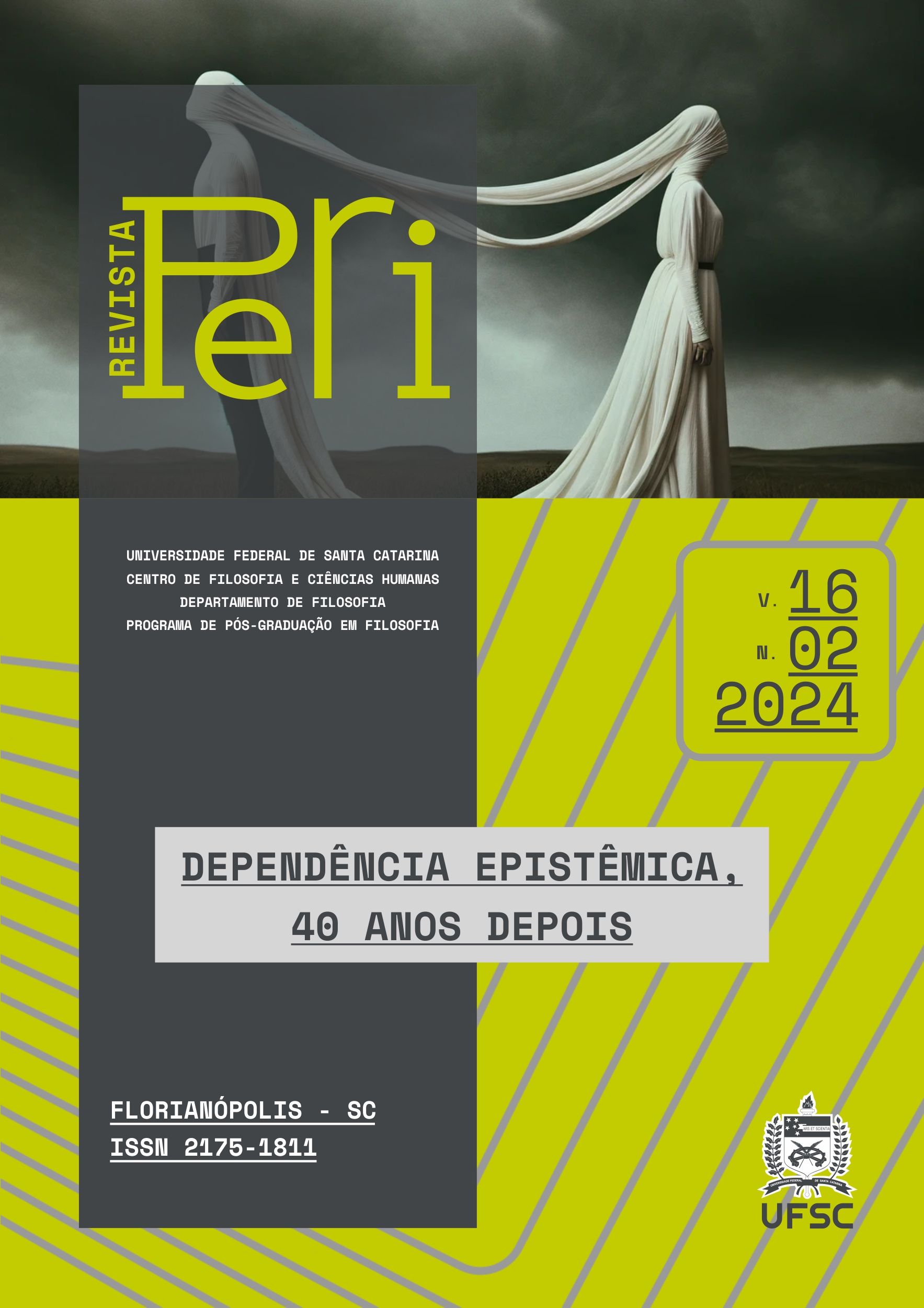Os Limites da Autonomia Epistêmica
A Crítica de Linda Zagzebski ao Egoísmo Epistêmico
Palavras-chave:
Epistemologia social, Anti-individualismo epistêmico, Autonomia epistêmica, Orgulho intelectualResumo
O objetivo deste artigo é falar sobre o que a autonomia epistêmica não é, a saber, uma forma de egoísmo epistêmico, segundo a qual o indivíduo deve confiar e depender somente em si mesmo na busca por bens epistêmicos (cf. Fricker, 2006). Apresento a crítica de Zagzebski (2020) ao egoísmo epistêmico com o qual a autonomia epistêmica é frequentemente identificada. Segundo Zagzebski, (a) não há boas razões para tomar o egoísmo epistêmico como um ideal; (b) o egoísmo epistêmico é incoerente, porque tem como consequência a confiança em outras pessoas; (c) o egoísmo epistêmico tem consequências indesejadas tanto para o indivíduo quanto para a comunidade epistêmica, limitando a produção de bens epistêmicos de ambos. Com isso, é revelada uma tensão entre o ideal de autonomia epistêmica e a busca pela verdade. O argumento da incoerência, de Zagzebski, é compatível com o endosso do anti-reducionismo sobre o testemunho e do anti-individualismo a respeito de bens epistêmicos, mas a autora não chega a explicitar a conexão de sua crítica ao egoísmo epistêmico com essas duas teses. Por isso, aponto o paralelo entre a rejeição de Miranda Fricker (2023) do reducionismo, devido a sua inadequação descritiva (seção 1) e a rejeição de Zagzebski do ideal de autonomia, devido a sua inadequação normativa (seção 2). Além disso, complemento à crítica de Zagzebski com a sugestão de um diagnóstico do que motiva o endosso do ideal de autonomia epistêmica, tendo em vista que não é a busca pela verdade o que o faz. Para isso, recorro à concepção de orgulho intelectual vicioso, de Greco (2021) (Seção 2.4). Greco argumenta que o individualismo epistêmico é uma manifestação do vício do orgulho epistêmico, e está comprometido com ideais e ilusões de autossuficiência, bem como com uma noção de autonomia epistêmica incompatível com a dependência epistêmica, bastante similar ao ideal de autonomia epistêmica como egoísmo, tal como Zagzebski o concebe. Essa aproximação entre as ideias de Zagzebski e Greco visa explicar o que motiva o egoísta epistêmico a valorizar a si mesmo mais do que valoriza a verdade. Se essa hipótese estiver correta, a tendencia anti-individualista da epistemologia contemporânea pode ser vista como uma reorientação bem-vinda, que manifesta a virtude da humildade intelectual (oposta ao orgulho intelectual vicioso) e abre caminho para reconceber a autonomia epistêmica de modo que ela seja compatível com a confiança em outros e com a dependência epistêmica.
Referências
ALSTON, William. Epistemic circularity. Philosophy and phenomenological research 47, 1986, p. 1 – 30.
_______. Beyond justification: dimensions of epistemic evaluation. New York: Cornell University Press, 2005.
BATTALY, Heather. Intellectual Autonomy and Intellectual Interdependence. In: MATHESON, Jonathan, LOUGHEED, Kirk (eds.). Epistemic Autonomy. New York: Routledge, 2022, pp. 154-172.
BEEBE, James. The Pitfalls of Epistemic Autonomy without Intellectual Humility. Social Epistemology, 38(3), 2024, p. 331 – 349.
COADY, C. A. J. Testimony. Oxford: Clarendon Press, 1992.
COLBURN, Ben (eds.). The Routledge Handbook of Autonomy. New York: Taylor & Francis, 2022.
FRICKER, Miranda. Injustiça epistêmica: o poder e a ética do conhecimento. Tradução Breno R. G. Santos. São Paulo: Editora da Universidade de São Paulo, 2023.
HARDWIG, John. Epistemic Dependence. Journal of Philosophy, 82 (7), 1985, p. 335 – 349.
FELDMAN, Richard. Epistemology. Upper Saddle River, New Jersey: Prentice Hall, 2003.
FOLEY, Richard. Intellectual trust in oneself and others. Cambridge: Cambridge University Press, 2001.
GRECO, John. Intellectual humility and contemporary epistemology: a critique of epistemic individualism, evidentialism and internalism. In: ALFANO, Mark; LYNCH, Michael; TANESINI, Alessandra (eds). The Routledge Handbook of Philosophy of Humility. New York: Routledge, 2021, pp. 271-282.
LEVY, Neil. Against Intellectual Autonomy: Social Animals Need Social Virtues. Social Epistemology, 38(3), 2024, p. 350 – 363.
MATHESON, Jonathan, LOUGHEED, Kirk (eds.). Epistemic Autonomy. New York: Routledge, 2022.
MATHESON, Jonathan (eds.). Special issue: epistemic autonomy. Social Epistemology, Volume 38, Issue 3, 2024a.
_______. Epistemic Autonomy and Intellectual Humility: Mutually Supporting Virtues. Social Epistemology, 38(3), 2024b, p. 318–330.
ROWLEY, William. Evidence of evidence and testimonial reductionism. Episteme, 9 (04), 2012, p. 377 – 391.
WAGENKNECHT, Susann. A social epistemology of research groups: collaboration in scientific practice. London: Palgrave-Macmillan, 2016.
ZAGZEBSKI, Linda. On epistemology. Wadsworth: Cengage Learning, 2009.
_______. Epistemic authority: a theory of trust, authority, and autonomy in belief. Oxford: Oxford University Press, 2012.
_______. Ethical and epistemic egoism and the ideal of Autonomy. In: ZAGZEBSKI, Linda. Epistemic Values, Oxford: Oxford University Press, 2020, pp. 263-274.
Downloads
Publicado
Edição
Seção
Licença
Copyright (c) 2025 Ian Salles Botti

Este trabalho está licenciado sob uma licença Creative Commons Attribution-NonCommercial-ShareAlike 4.0 International License.
1. Autores mantém os direitos autorais e concedem à revista o direito de primeira publicação, com o trabalho simultaneamente licenciado sob a Creative Commons Attribution License que permite o compartilhamento do trabalho com reconhecimento da autoria do trabalho e publicação inicial nesta revista.
2. Autores têm autorização para assumir contratos adicionais separadamente, para distribuição não-exclusiva da versão do trabalho publicada nesta revista (ex.: publicar em repositório institucional ou como capítulo de livro), com reconhecimento de autoria e publicação inicial nesta revista.
3. Autores têm permissão e são estimulados a publicar e distribuir seu trabalho online (ex.: em repositórios institucionais ou na sua página pessoal) a qualquer ponto antes ou durante o processo editorial, já que isso pode gerar alterações produtivas, bem como aumentar o impacto e a citação do trabalho publicado (Veja O Efeito do Acesso Livre).


